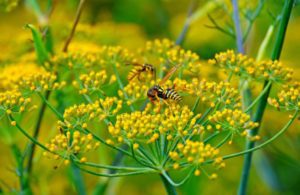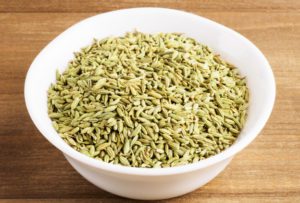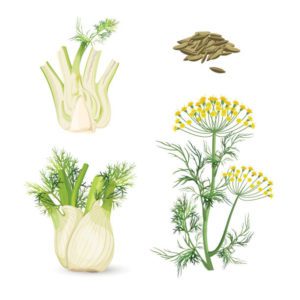Fennel

Scientific name: Foeniculum vulgare
Introduction: Fennel is a tasty herb that has long been appreciated as medicine, spice and food in many parts of the world. It is an easy perennial to grow that looks attractive in any garden. Fennel lends well with other herbs in formulas for a number of medicinal uses. Fennel blends well with other herbs in formulas for a number of medicinal uses. Its medicinal use is also backed by scientific research. Foeniculum, meaning “little hay”, may describe the leaves, although some scholars believe that the name refers to the leaves’ use as animal fodder. Vulgare means common.
Propagation: The seeds readily germinate in about two weeks. Sow them in spring or early fall. They prefer darkness and a soil temperature around 65 degrees F. Once established, fennel self-seeds abundantly. Make sure to weed out any unwanted seedlings when they are only a few inches tall, before they work their taproot deep into the soil.
Fennel needs little garden care. It works well located in the background, where it makes a dramatic visual display and cannot overtake pathways. Plus, it requires little garden access until the seeds are harvested in late summer. Various wasp species visit fennel flowers, so be sure to plant it out of the walkway and away from commonly visited areas.
Harvesting: Fennel does not drop its seeds until ripe, making them easy to harvest. Cut the umbels at the stem when the seeds have turned brown and developed ridges. They can be removed and laid on a screen, but it is easier to tie them together and hang the bundle upside down inside a paper bag. Secure the top of the bag around the stems with string, and seeds will conveniently collect at the bottom as they fall off the stem. I rub the bag to release the last few seeds. In humid climates, cutting holes in the bags sides provides better airflow for faster drying.

Medicinal Uses: Medieval herbalists loved fennel for both its medicinal and culinary attributes. Roman emperor Charlemagne made it mandatory to plant it in his imperial herb gardens throughout Europe during the eighth century. It was one of nine Anglo-Saxon holy herbs to combat their nine forms of disease.
Fennel flavors the very food it helps digest. It relaxes the digestive tracts’s smooth muscles to relieve indigestion, especially bloating and gas. It also stops griping and cramping, so is often given with herbal laxatives that cause this. Fennel seed is featured in the popular bitter spray remedy that you take before meals to optimize digestion and post meal bloat.
Traditional European, Ayurvedic, and Chinese medicine all describe fennel as easing digestive woes, such as colic, particularly in babies. In one study, infants given fennel, chamomile, and lemon balm cried a third less.
Fennel is in the German product Lomatol, which worked better than the drug metoclopramide in a two-week study with sixty people suffering from irritable bowel syndrome (IBS). It relieved indigestion, nausea, heartburn, and gas. Fennel also helps prevent stomach ulcers by inhibiting the bacterium Helicobacter pylori responsible for causing them.
Fennel seed, leaf and even the root have been considered appetite suppressors since the time of ancient Egypt. Early Anglo-Saxons chewed fennel on religious fast days, a practice adopted by christian parishioners, who discreetly tucked seeds in their Bibles to ease their appetite while enduring long sermons. It came in handy that the seeds were thought to dispel both evil and gas! Nowadays, the seeds goes into diet aid products.
Fennel is a popular diuretic that relieves inflammation and irritation throughout the urinary tract. In herbal formulas, it helps eliminate kidney stones. It even may protect the kidneys and pancreas from damage and possibly lowers high blood sugar, supporting its folk medicine use for diabetes.
Thanks to its essential oil, fennel seed worked better in the lab than the powerful food preservative BHT (butylated hydroxytoluene) against twenty-five strains of bacteria. These included many that are responsible for food poisoning and spoilage, such as Escherichia coli, Salmonella, and Listeria. Fennel seed also deters the food spoilage fungi Aspergillus niger and Fusarium oxysporum as well as Candida albicans, Herpes simplex viruses, staph infection, and some types of protozoa. In addition, it was one of the six out of twelve eseential oils found effective against flu virus type 3.
But remember not all essential oils are created equal. I trust this brand as they’re third party lab tested and certified organic.
Strong fennel tea is my favorite eyewash. It is both soothing and antiseptic, but it must be well strained through a coffee filter. Administer it in an eyecup. European herbalists historically recommended fennel to treat eyelid infections and conjunctivitis. Researchers say it actually may work as well as antiglaucoma drugs like timolol to reduce pressure in the eye.
Fennel goes into cough drops, syrups and lozenges as an antibacterial to relieve a sore throat. Anethole (a component of fennel’s essential oil) is a bronchodilator structurally similar to epinephrine (adrenaline); it stimulates contraction of the tracheas’s smooth muscles to facilitate expectoration. Because it makes respiratory cilia more mobile and able to transport trapped particles from the lungs, researchers think it helps reverse bronchial problems that developed from inhaling contaminants like air pollution.
Fennel is anti-inflammatory and pain relieving. The seed is chewed or made into a paste for toothache. While it does not provide clove’s or spilanthes numbing effect, it also does not have cloves burning sensation. Traditional Chinese medicine recommends a hot fennel compress to ease back or abdomen pain that is associated with cold. Hernia pain is relieved by both the compress and drinking fennel tea, then lying on the back with knees bent.
Fennel is a well-rounded phyto-estrogen through its compound estragole. Estragole is thought to compete with and inhibit the brains neurotransmitter dopamine because they share receptor sites. Fennel has long been a favorite to increase mother’s milk. Mediterranean goats are also fed fennel to increase not only production but also fat content of their milk. Fennel seed and leaves, when fed to rabbits also flavor their meat. It promotes menstruation and reduces menstrual cramps.

Fennel treats a slow or obstructed liver and gallbladder and even helps protect the liver from toxicity. Herbalist Nicholas Culpeper said in his seventeenth-century Herbal that fennel helps the liver neutralize poisons in the body. It is also reputed to reduce after effects on the body of drinking alcohol. Fennel’s essential oil is a potent mixture of antioxidant phenols, limonene, and myrcene compounds, which seem to encourage the liver to manufacture more of the potent, detoxifying antioxidant gluthahione. One study saw anethole slow the livers breakdown of acetaminophen. This makes the drug active longer, so more effective. The result is that less drug is needed and so fewer side effects result.
When palestinian traditional healers recommended twenty-four of their medicinal plants to fight cancer, fennel was among them. When scientists tested it, fennel seed displayed an antitumor effect on human breast cancer and leukemia cells. It may help prevent cancerous tumors from forming. Fennel may posses even more immune system-modulating properties.
Long used as an Ayurvedic antidepressant, fennel does reduce stress and anxiety according to scientific research. Preliminary studies suggest that it helps with memory loss as well as cognitive disorders such as dementia and Alzheimer’s disease. The peeled stalk was once recommended to treat nervous system problems. The seventeenth-century Acetaris, A Discourse of Sallets, by herbalist John Evelyn, suggests it induces sleep and makes one relaxed and even more pleasant!
Energetics: Slightly warming and drying depending on the source. It strengthens the digestive fire, agni, without aggravating the hot pitta constitution.
Actions: Digestive, aromatic bitter, carminative, diuretic, antibacterial, antiviral, anti-inflammatory, antispasmodic, anodyne, hepatoprotective, anti-pyretic, galactagogue, antithrombotic, anxiolytic, and memory enhancing. Fennel also appears to be hypoglycemic, antitumor, and hypolipedemic.
Precautions and Considerations: Whereas regular doses protect the liver, extremely high amounts of fennel activate the nervous system, even causing convulsions, and act, at least in animals, as liver toxins. However, researchers declared a moderate amount is very safe. Epileptics and pregnant people should restrict fennel ingestion to food/tea and not use the essential oil at all. Anethole also seems to inhibit blood clotting, so do not use it therapeutically before surgery or when taking blood thinners. A few allergic responses to fennel have been documented, but are rare. They seem linked to allergic reactions to celery (Apium graveolens).
